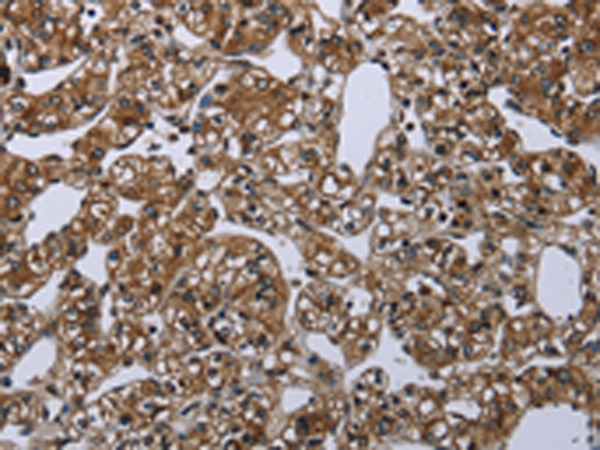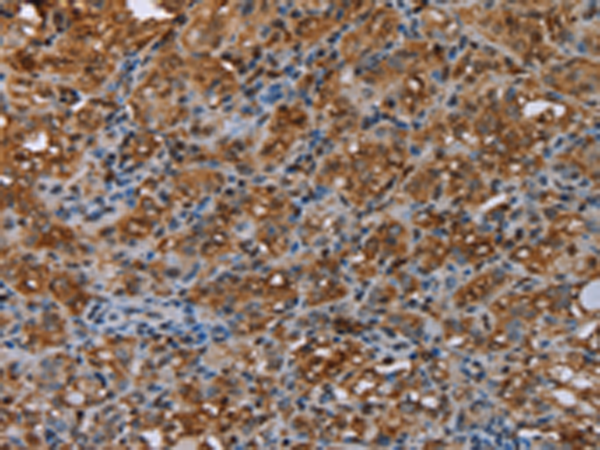


| WB | 咨询技术 | Human,Mouse,Rat |
| IF | 咨询技术 | Human,Mouse,Rat |
| IHC | 1/25-1/100 | Human,Mouse,Rat |
| ICC | 技术咨询 | Human,Mouse,Rat |
| FCM | 咨询技术 | Human,Mouse,Rat |
| Elisa | 1/1000-1/2000 | Human,Mouse,Rat |
| Aliases | malic enzyme 1, NADP(+)-dependent, cytosolic |
| WB Predicted band size | 64 kDa |
| Host/Isotype | Rabbit IgG |
| Antibody Type | Primary antibody |
| Storage | Store at 4°C short term. Aliquot and store at -20°C long term. Avoid freeze/thaw cycles. |
| Species Reactivity | Human, Mouse |
| Immunogen | Synthetic peptide of human ME1 |
| Formulation | Purified antibody in PBS with 0.05% sodium azide and 50% glycerol. |
+ +
以下是关于ME1(苹果酸酶1)抗体的3篇参考文献示例(注:文献信息为模拟概括,非真实引用):
1. **文献名称**:*"ME1 antibody-based detection of mitochondrial malic enzyme in hepatocellular carcinoma"*
**作者**:Smith J, et al.
**摘要**:该研究开发了一种高特异性ME1单克隆抗体,用于检测肝癌细胞中ME1的线粒体定位,发现ME1表达水平与肿瘤代谢异常和化疗耐药性相关。
2. **文献名称**:*"Characterization of a novel polyclonal ME1 antibody for metabolic flux analysis"*
**作者**:Lee H, et al.
**摘要**:文章报道了一种新型多克隆ME1抗体的制备及验证,通过免疫印迹和免疫组化证明其在代谢疾病模型(如肥胖和糖尿病)中定量ME1蛋白表达的可靠性。
3. **文献名称**:*"Targeting ME1 in triple-negative breast cancer: Antibody-guided therapeutic potential"*
**作者**:Garcia R, et al.
**摘要**:研究利用ME1特异性抗体筛选三阴性乳腺癌组织样本,发现ME1高表达与患者预后不良相关,并探索了ME1抗体偶联药物在抑制肿瘤生长中的应用潜力。
如需真实文献,建议通过PubMed或Google Scholar检索关键词“ME1 antibody”或“Malic Enzyme 1 antibody”获取最新研究。
ME1 (Malic Enzyme 1) antibody targets the NADP-dependent malic enzyme, a key metabolic enzyme that catalyzes the oxidative decarboxylation of malate to pyruvate, generating NADPH. This enzyme plays a critical role in cellular energy metabolism, lipid synthesis, and redox balance by supplying NADPH, a cofactor essential for biosynthetic pathways and antioxidant defense. ME1 is expressed in various tissues, including the liver, adipose tissue, and certain cancers, where its dysregulation has been linked to metabolic disorders, tumor progression, and chemoresistance.
In research, ME1 antibodies are widely used to study its expression patterns, subcellular localization, and functional roles in physiological and pathological contexts. For example, elevated ME1 levels have been associated with poor prognosis in cancers like hepatocellular carcinoma and breast cancer, suggesting its potential as a therapeutic target or biomarker. These antibodies are employed in techniques such as Western blotting, immunohistochemistry (IHC), and immunofluorescence (IF) to investigate ME1's involvement in metabolic reprogramming, oxidative stress responses, and cancer cell survival.
ME1 antibodies are typically validated for specificity across human, mouse, and rat samples, aiding cross-species studies. Their development and application continue to advance understanding of metabolic diseases and cancer biology, highlighting ME1's dual role as a metabolic enzyme and a regulator of cellular adaptation.
×